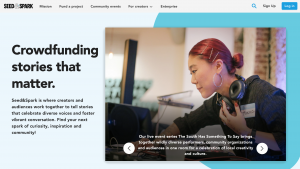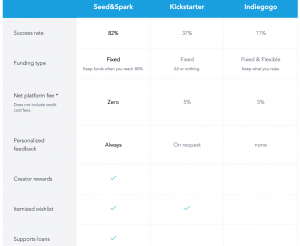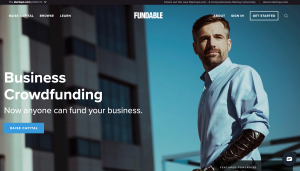Can I Get My Business Off The Ground With Crowdfunding?

Technology and social outreach have made it uncomplicated to use online crowdfunding platforms to raise funds for business ideas, non-profit purposes, or personal needs. To date, people around the world have raised over $34 billion using these platforms and are using easy-to-use tools that provide a seamless experience for both fundraising and their donors.
The global crowdfunding market is expected to reach a value of $42.93 billion by 2028, at a CAGR of 16.40% over the forecast period 2022–2028 (yahoo finance).
Crowdfunding Platforms
Every large enterprise that we know today was once an idea, and it takes years maybe decades of learning, unlearning, resilience, and conviction to turn it into a successful business. You may have the courage but lack the resources to start a business. Your idea may never take off with capital infusion.
Today’s crowdfunding platforms are enabling aspiring entrepreneurs to realize their dreams. Major investors and venture capitalists may not be ready to just invest in ‘ideas’ yet Crowdfunding is a great way to help startups generate start-up capital for their business. That’s the upside in the reach of the internet.
Crowdfunding is a fundraising practice for projects that internet users see as promising. Their contributions may be small, but good sales can help you expand your ideas into a successful business much faster than you might expect.
Let us look at some of the most popular global crowdfunding platforms:
Kickstarter

- Fee: 5% of funds raised
- Ideal for: Startups, Inventors, Filmmakers, Artists, Techies, Content creators, Designers, etc.
- Model: Reward-based. Investors who support a project on Kickstarter will expect to receive rewards that can be in the form of a product prototype.
Kickstarter is one of the largest global crowdfunding platforms. This is a prolific crowdfunding platform for aspiring entrepreneurs, inventors, and startups. Since its launch in 2009, 22 million people have participated in 231,952 successfully funded projects.
The top categories are Games, Music, Film & Video, Art, and Publishing
GoFundMe

- Fee: 2.9% + 30 cents on transactions
- Ideal For: Individuals and Corporate charities
- Model: Donation-based
Since its inception in 2010, GoFundMe has a global community of 100 million people with $17 billion+ raised. There have been 200 million+ individual donations on the platform.
Indiegogo

- Fees: 5% of total funds raised
- Ideal For: Techies, Startups, inventors, small businesses, community/charity causes, etc.
- Model: Reward-based
The Indiegogo community has backed 800,000 innovative ideas since 2008. There are ~19,000 campaigns that are launched on the platform. The benefit of using Indiegogo is the provision to continue running your campaign even if you don’t reach your funding goal. This feature is not available on all crowdfunding platforms.
Seed&Spark

- Fee: No platform fee
- Ideal For: Creators, Artists, and Filmmakers
- Model: Reward-based
Seed&Spark operates in a niche space. Filmmakers and content creators can fund their projects and receive production support from listed partners. Seed&Spark fans have raised over $39 million in over 3000 movies and projects.
A comparison of crowdfunding platforms –

(seedandspark.com)
Fundable

- Fee:$179 a month to fundraise, 3.5% + $0.30 per transaction for merchant processing
- Ideal For: Small businesses and startups
- Model: Rewards as well as Equity-based
Fundable is a popular platform among startups as founders can launch equity crowdfunding campaigns to raise capital from venture capitalists, angel investors, and accredited investors. The platform offers a range of funding options, as well as access to a plethora of resources for startup entrepreneurs.
Wefunder

- Fee: 7.5% of the total amount raised
- Ideal For: Startups
- Model: Equity-based
Over 1000+ companies have received funding through Wefunder. For as low as $100 anyone can invest in startups.
How can you get your business idea out there?
One of the biggest attractions of crowdfunding is that anyone can do it. Many crowdfunding platforms allow users to create campaigns to raise funds for their efforts in a few simple steps.
However, online crowdfunding has some issues and cannot guarantee success. Taking the necessary steps before starting your campaign will increase your chances of achieving your goals. Every business idea is unique in itself, for every business idea, there are people out there ready to invest and see the idea grow into an actual product.
Crowdfunding platforms are a great and easy way to do just that, you just have to find a platform that is catered to your needs and the business idea that you will be putting forward.
Crowdfunding platforms have their promotions and you can get on them by paying a small fee in the form of advertisement fees. Once your idea is out there it is completely up to the public and whether they find the business idea interesting enough to donate.
Some examples of business ideas that have gone through crowdfunding
Oculus

(occulus.com)
Oculus, a virtual reality headset purchased by Facebook in 2014 for $ 2 billion. But before that, the company started by raising $ 250,000 on Kickstarter to produce the Oculus Rift headset. In 4 hours, the campaign reached its goal. The campaign eventually raised $ 2.4 million.
Fidget cube
Nicknamed ‘Children’s Toys for Adults,’ the toy raised $ 6.4 million on Kickstarter. Its simple design has led to dozens of copies of the toy, but it is still popular among super-energetic adults working in an office environment.

(kickstarter.com)
Companies that made it big after crowdfunding
Brewdog was founded by James Watt and Martin Dickie in 2007. Brewdog has raised £126m through crowdfunding. BrewDog claims to be valued at around £2 billion which is over 10 times its net revenue.
Monzo was launched in 2015 as a new type of bank that was based operated by users on an app. Monzo broke the record for the quickest crowdfunding campaign in history by raising £1m in over a minute and a half. Monzo has 6 million customers in the UK and now has entered the US market.
How do you launch a crowdfunding campaign?
Once you’ve finalized a platform for your business idea, here are some tips to get started on your campaign –
1. Define your crowdfunding goal – How much do you want to raise?
2. What are you offering investors – The offer could be in the form of equity in your company or a reward, e.g., a unit of the product that you’re raising the campaign for. You can also introduce levels of rewards depending on the size of the investment.
3. Communication is key – Ensure that your marketing message is simple and clear, and potential backers understand what they’re investing in. Nothing tells a story better than a video. Have a social media plan in place to market your campaign.
4. Bet on your inner circle – If your family and friends like what you have to offer, ensure that they invest at the beginning of the campaign. This will help increase traction and provide confidence to potential backers of your project or business.
Conclusion
While we established why crowdfunding is an option to get your startup or project off the ground, let’s look at the pros and cons of crowdfunding.
Pros
- You may not have to give away equity
- It’s the best way to test a product
- Crowdfunding is the first milestone in your long-term funding goal
- Crowdfunding platforms manage the entire process of fundraising – launching a campaign, managing payments, and interacting with potential bakers.
Cons
You may not always receive positive feedback. You will have to persist if you feel that your idea is worth pursuing. Negative feedback may also sway potential investors in the other direction.
At the end of the day, you, as the founder will have to market your product, crowdfunding platforms connect you with potential backers who are (registered) members of the platform that you’re on. There are investors beyond the platform. Products and businesses have been known to fail because they’ve been poorly marketed.




